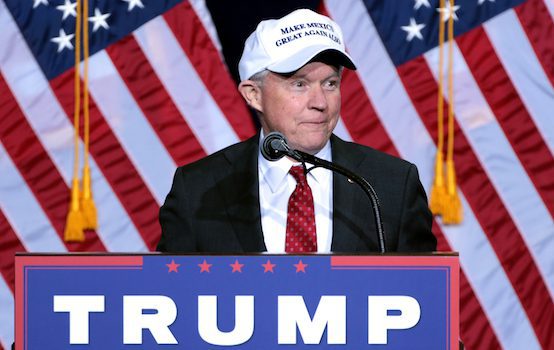Who Is More ‘Pro-Trump’—Jeff Sessions or Lindsey Graham?

Challenging the bipartisan consensus on immigration; advocating a more populist and nationalist variant of conservatism than the Paul Ryan wing of the Republican Party; seeking to recast the GOP as a workers’ party; employing Stephen Miller.
Before Donald Trump, the main figure in Washington willing to take up these tasks was Jeff Sessions. A well respected senator and Southern gentleman, his lack of charisma and lingering baggage from a failed judicial nomination—the Alabaman was accused of racism and Borked—limited how far he could go politically. So it made sense that Sessions became the first member of the Senate to don the red “Make America Great Again” baseball cap and endorse Trump for president.
The news that Sessions has been sacked as attorney general—he technically stepped down, but his resignation letter made clear he did so at the president’s request—raises an interesting question of what it means to be pro-Trump as divided government comes to town.
Perhaps no Cabinet officer was more committed to the platform the president ran on than Sessions, who championed this policy agenda before Trump even declared his candidacy. He was overzealous about law and order to the point of occasionally being a menace to civil liberties, but more punctilious about the rule of law than his boss, who shared the same trait (if not Sessions’ hang-ups about marijuana).
Like Tom Hagen in the Godfather trilogy, Sessions may not have been a wartime consigliere. But he took a risk in supporting Trump when he did and was lured from a safe Senate seat, for which he last received more than 97 percent of the vote, to run the Justice Department.
Yet Trump always complained that Sessions was insufficiently loyal. The source of their rift was Sessions’ decision to recuse himself from the Russia investigation. Trump may be right that neither Eric Holder nor Loretta Lynch would have relinquished their control over such a sensitive matter under Barack Obama. But Sessions had a strong case for his recusal on the merits and in any event, Trump’s handling of FBI Director James Comey’s firing did more than anything Sessions did to set in motion the chain of events that led to the appointment of special counsel Robert Mueller.
A senator atop the list of potential Sessions replacements (however implausibly) is Lindsey Graham, the South Carolina Republican. He has in recent months positioned himself as a Trump loyalist even if there is every indication his views on immigration and foreign policy remain closer to the late John McCain’s than the president’s. Graham’s main change of heart appears to be over whether there should be “hell to pay” for firing Sessions amid the Mueller probe.
As he had done under George W. Bush, Graham collaborated with liberal Democrats during this year’s immigration talks. The difference was that this time, the GOP president was not with him and gave conservative restrictionists a place at the bargaining table. Sen. Tom Cotton of Arkansas is also seen as pro-Trump. On immigration, he actually is, though both he and Graham are far removed from the president’s “America First” impulses on military intervention abroad.
Does being pro-Trump mean serving the ideas that helped make the businessman and reality TV star president in the first place? Or does it mean protecting him from Mueller, congressional oversight and hits to his ego while transforming the White House into Bush 2.0? The new acting attorney general Matthew Whitaker seems to be in the latter camp, while former chief strategist Steve Bannon gave us some sense of understanding which moves might be impeachment bait.
All this comes at a time when the House has fallen under the control of Democrats who wish to see Trump shuffled from office one way or another and the incoming Republican senators are more beholden to the president than their predecessors. Does this mean they will be pro-Trump in the sense reforming immigration and looking to shrink our commitments overseas? Or will they praise the president at rallies and defend him on Fox News?
The answer may go a long way toward deciding whether the GOP can truly be a workers’ party or merely a party of Trump’s workers.
W. James Antle III is editor of The American Conservative.
Comments